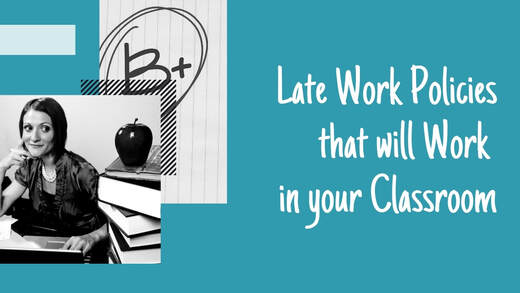Late Work Policies that will Work
in your Classroom
Big decisions, policy changes, and pressure to appease are no stranger to those of us in education. We face them every year. In my last post I discussed the struggles with deciding whether or not to accept Late Work from students in the classroom. In case you missed it – head HERE to read it.
Having taught 6th graders for so long, I’ve become very familiar with developmental age of the 11 turning 12 year old. All of my opinions in this post are based on my experience with students of this age. Different developmental age groups may yield varying results.
As a young, inexperienced teacher, I started my career in a private school where expectations were high. Late Work was virtually non-existent. Honestly, it was never really an issue. When a student did not complete their work, they quite obviously felt bad about it – I could clearly see it in their behavior and attitude. Students would stay in from recess to complete an assignment or bring it to me early the next morning before the first bell. All because they didn’t want to be – that student.
High expectations is part of who I am – even outside of the teaching world. It was easy for me to see the expectations of private school as normal. However, like all institutions, private school was not without its challenges. After two years I found myself heading to public school for a change and higher pay.
Upon entering the public school system, I found myself teaching at a Title One school with many transient students and those from low income housing areas. Not only was I learning the public school system, I was dealing with a very different dynamic of students. Most noticeably was their different attitude towards education. I started out with the policies I had previously used, which basically equated to – No Late Work. This proved to be a challenge with my students, parents, administration, and my colleagues. I soon took to a new approach – accepting Late Work for up to one week after the original due date. If students did not complete an assignment, they filled out a Homework Slip instead, and it was posted on a board under the coordinating day of the week. When a student finally did complete the assignment, they took down the Homework Slip and attached it to the assignment before turning it in. Having the board that visually showed how many assignments were missing and when they were due, was a huge help in management.
I still found myself on a quest to find a better way. This is where my quest to promote responsibility in my students truly began. I wanted to see my students believe in themselves, meet expectations, and find success. It was also around this time I was working on my master’s degree, and my final project became Promoting Self-Efficacy in the Classroom.
I experimented with other policies, such as accepting Late Work only until the end of the unit or grading period, but always working towards no Late Work by 4th quarter, insisting they needed to be preparing themselves for middle school. I even tried giving students 3 life-lines each quarter, an adaptation of the tv show, Who Wants to be a Millionaire, which was popular at the time.
When my career landed me teaching 6th grade in middle school, I had no idea of the shock that awaited me.
When I proposed the policy of No Late Work, I was met with shock and grumblings from colleagues and my administration.
Here I was thinking I was preparing my students for the reality of secondary school. And was clearly being told that this was not the case.
But, WHY?
Turns out, I was working with 6th, 7th & 8th grade teachers and administrators who did not want to deal with the parental backlash.
Much to my dismay, I relented and allowed Late Work to be turned in, ONLY until the end of the current unit of study – which was test day. After that, assignments became permanent zeros.
Much to my dismay, I relented and allowed Late Work to be turned in, ONLY until the end of the current unit of study – which was test day. After that, assignments became permanent zeros.
|
But there was still something inside of me that wouldn’t give up. I decided to keep my expectations high, despite the lack of support I received. If students did not complete an assignment, they had to fill out a Homework Slip to turn in instead. The most important aspect of this slip, was the reason the student wrote for why they didn’t complete the assignment. I began copying this statement verbatim into my grade-book next to the zero.
|
This one action proved to be my life-saver. No longer were parents hassling me about accepting work, but the focus returned to the student and why they didn’t complete it in the first place.
But I wasn’t done there. I wanted to push my students to their capabilities. By second semester, I stopped providing extra copies of assignments to students who had lost them. And by 4th quarter, I did not accept ANY Late Work.
And you know what, my students met my expectations. Set the bar high, provide the support they need, and they can do it. They will do it.
High expectations for teachers and students. It really is possible.
Now, contrary to what some people may believe, I do have a compassionate side. I understand that sometimes there are things that happen that nobody can control. After all, we are all human and do make mistakes. Here’s what others don’t see: that conversation I have with a student who is in tears over forgetting their assignment somewhere. Maybe it’s on the counter, maybe their parent forgot to put it back in their folder after checking it over, maybe... To that student I might say Turn it in to me by the end of the school-day or Bring it to me first thing tomorrow morning before school starts and I will still accept it. There are ways to be understanding while still holding high expectations. Both of these statements contain a compromise that requires the student to seek me out to get the assignment turned in. They are the ones making the effort.
The first time I had a parent of a former student tell me how I (their 6th grade teacher) prepared their child for college more than any other secondary teacher, was one of the best days of my teaching career. I knew that what I was doing was making a difference.
Stick to your guns – keep fighting the good fight!
But I wasn’t done there. I wanted to push my students to their capabilities. By second semester, I stopped providing extra copies of assignments to students who had lost them. And by 4th quarter, I did not accept ANY Late Work.
And you know what, my students met my expectations. Set the bar high, provide the support they need, and they can do it. They will do it.
High expectations for teachers and students. It really is possible.
Now, contrary to what some people may believe, I do have a compassionate side. I understand that sometimes there are things that happen that nobody can control. After all, we are all human and do make mistakes. Here’s what others don’t see: that conversation I have with a student who is in tears over forgetting their assignment somewhere. Maybe it’s on the counter, maybe their parent forgot to put it back in their folder after checking it over, maybe... To that student I might say Turn it in to me by the end of the school-day or Bring it to me first thing tomorrow morning before school starts and I will still accept it. There are ways to be understanding while still holding high expectations. Both of these statements contain a compromise that requires the student to seek me out to get the assignment turned in. They are the ones making the effort.
The first time I had a parent of a former student tell me how I (their 6th grade teacher) prepared their child for college more than any other secondary teacher, was one of the best days of my teaching career. I knew that what I was doing was making a difference.
Stick to your guns – keep fighting the good fight!
You May Also Like...
Let's Connect...

Welcome! I'm Hillary Midgley, a veteran 6th grade teacher.
I create educational materials and develop curriculum for other teachers. I specialize in teaching students how to learn through my Study Skills Curriculum. I have established fundamental classroom systems and structures for teachers to help them streamline their classroom. And my passion is teaching ancient history through engaging activities with foundations in academic skills. Here you will find resources on all of these topics and more. Learn more about me here.
Want more great teaching tips, organization and management ideas?
Visit us on Facebook, Instagramand Pinterest!
Visit us on Facebook, Instagramand Pinterest!
|








